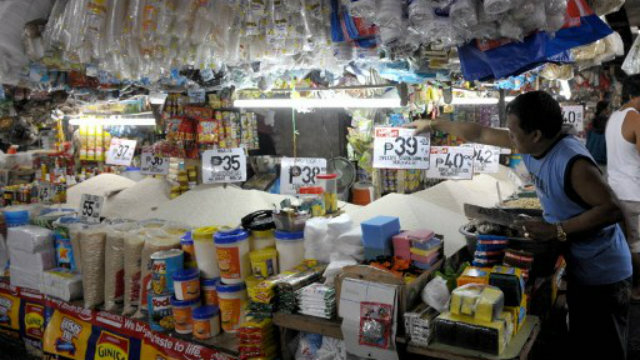SUMMARY
This is AI generated summarization, which may have errors. For context, always refer to the full article.

MANILA, Philippines (UPDATED) – Inflation shot up to a nearly 3-year high in July as millions of poor Filipinos endured steep price rises for essential foods, data from the government statistics agency showed Tuesday, August 5.
The central bank said it would not hesitate to further tighten policy rates to curb price pressures.
Inflation or the rise in prices of goods and services was 4.9% in July, the highest since October 2011, when it stood at 5.2%.
“This was mainly due to the jump in the growth of the heavily-weighted food and non-alcoholic beverages index,” the Philippine Statistics Authority said in a statement.
Also on the uptrend were housing, tap water, electricity and petrol prices, as well as transport costs and tuition fees, it added.
The Philippines has had one of the fastest-growing economies in Asia in recent years, growing by 7.2% in 2013 then slowing slightly to 5.7% in the first quarter.
But President Benigno Aquino III’s government has been criticized for failing to combat deep poverty, with much of the country’s new found wealth being soaked up by the nation’s elite.
About one quarter of the country’s 100 million people lived below the poverty line in 2012, according to government data, and recent surveys have shown the poor do not feel they are benefiting from the fast growth.
Fifty-five percent of Filipino families rated themselves as “poor” in a June survey, up three percentage points from the 2013 average, according to independent Manila pollster Social Weather Stations.
Sharply rising food prices have been one of the biggest concerns.
National Economic and Development Authority (NEDA) Director-General Arsenio Balisacan said food prices grew sharply in July, mainly due to the tightness of rice supply.
“Rice prices remained at high levels,” he said.
Rice prices increased 14.4% year-on-year in July, faster than the 13.6% growth recorded in June.
Despite the July uptick in inflation, Balisacan said they expect the average to reach 4.4% this year, within the government’s target of 3% to 5%.
He said the tightness in rice supply would end soon, thanks to augmented rice imports.
This, along with actions to be taken by the central bank, will “put a brake on potential price pressures,” he added.
Monetary policy
Bangko Sentral ng Pilipinas (BSP) Governor Amando Tetangco said in a text message: “we will not hesitate to use any of our tools to help guide market to keep inflation within the target range over the policy horizon.”
Last week, the BSP raised its overnight borrowing and lending rates by 25 basis points to 3.75% and 5.75% respectively, marking the first time it raised the rates since May 2011.
It said the decision was “a pre-emptive response to signs of inflation pressures and elevated inflation expectations.”
It added it was also a “a pre-emptive measure in the context of the eventual normalization of monetary policy in some advanced economies.”
Government interventions
Balisacan reiterated the importance of putting the needed policies in place to manage inflation.
“Given the potential upside pressures linked to possible increases in food and oil prices and pending petitions for adjustments in utility rates, short term interventions may focus on ensuring supply adequacy by allowing sufficient levels of imports to augment local production of rice and other key commodities,” he said.
Balisacan cited the government’s efforts to speed up the implementation of programs intended to increase the productivity of agriculture and food processing industries.
Balisacan said increasing agricultural productivity is needed to ensure adequate local supply of food, bring down prices, and increase farmers’ incomes. – Rappler.com, with a report from Agence France-Presse
Add a comment
How does this make you feel?
There are no comments yet. Add your comment to start the conversation.